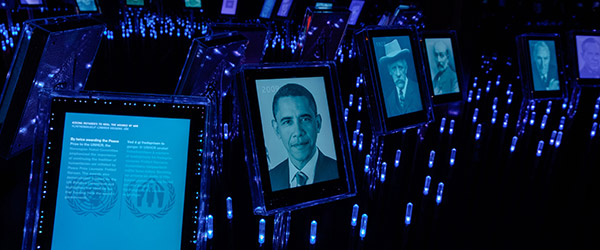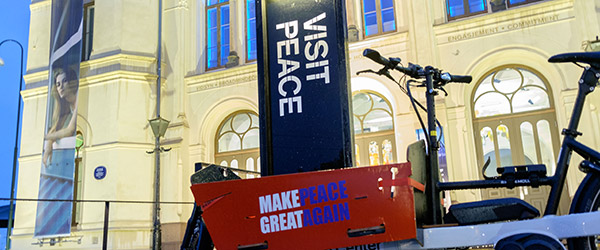Ksenija Simic-Muller, program director of Pacific Lutheran University’s Peace Scholars program, says building peace isn’t a distant or impossible ideal. And many former Peace Scholars prove it.
“It’s something that happens between individuals and ordinary people, through dialogue,” said Cate Rush ’19, one of the most recent participants. “It’s not this lofty, abstract concept.”
Simic-Muller says Rush and her counterpart, Austin Beiermann ’18, aren’t the only Peace Scholars who returned to PLU ready to apply what they learned abroad in the seven-week program.
Ellie Lapp ’17 and Taylor Bozich ’17 used their newly acquired dialogue skills within student government, for example. Others used what they learned in student clubs and organizations, during presentations at conferences and in their activism across campus.
“They all say that the dialogue skills they learned, in particular, have been beneficial to them in all their involvement on campus and in the community,” said Simic-Muller, an assistant professor of mathematics at PLU.
Each year since the program was established in 2011, two students have been selected as Peace Scholars to deepen their understanding and application of peacebuilding. The scholars travel to Norway, known as a hub for humanitarian and peace organizations. During their time abroad, they participate in an intensive, weeklong workshop at the Nansen Center for Peace and Dialogue in Lillehammer. Then, they attend the Oslo International Summer School for a six-week peace studies course. They also visit a number of Norwegian peace organizations, including the Nobel Peace Prize Institute. They engage with students from all over the world in what is regarded as a life-changing experience, Simic-Muller said.
“The program really has to take place in Norway, because it is affiliated with the Nobel Peace Prize,” she said.
Because of that tie, the Peace Scholars’ networking doesn’t end in Norway. They also travel to Minneapolis in September for the Nobel Peace Prize Forum Augsburg, an annual event that welcomes Nobel laureates and other important national and international figures pivotal to the peacebuilding community.
In the fall, Beiermann and Rush were privileged to participate in high-level dialogues prior to the event. Among their many activities, the scholars facilitated a session with Mark Mulder, assistant professor of business at PLU, about the role of water in promoting peace.
“I had the opportunity to network with diplomats, elected officials, scholars, activists and people from essentially every walk of life,” Beiermann said. “I had the ability to talk with a lot of big players in the global struggle for peace and be taken seriously.”
Rush said her time abroad is hard to put into words. “Those were some of the best weeks of my life,” she said. “It was such an incredible and unique experience.”
But their peacebuilding wasn’t limited to the Midwest and Scandinavia. Rush and Beiermann brought home the skills they learned and immediately put them to use. The pair is helping plan a series of events this spring featuring John Noltner. The American photographer and peace activist will come to campus the week of March 11, visiting classes and bringing students into an interactive photography project centered on peace.
“It will expose the PLU community to what peacebuilding looks like on a personal basis,” Rush said.
Rush says PLU’s mission intersects with many core values in Norway, so the Peace Scholars program is a perfect fit for Lutes.
“There is this sense of duty, responsibility, social engagement that I really see are reflected in students at PLU, serving here and beyond,” she said.
Beiermann said those values connect people from all walks of life, from around the world. He’s grateful to have met them.
“Countries are no longer these arbitrary spaces on a globe,” he said. “They now have faces and people connected to them.”
Applications for the program are accepted each year until February; participants are selected in the spring based on their motivation and purpose, depth of understanding and intellectual curiosity of peace, as well as openness to new ideas and perspectives.
“We are looking for students who want to learn about peace and how to be agents of peace in the world,” Simic-Muller said. “There is no one trait that guarantees that a student will be selected. We are looking for a variety of perspectives and interests.”
One of Rush’s goals as a returning Peace Scholars participant is to help with that e ort, by mentoring new scholars.
Beiermann’s idea of an ideal candidate for the program is a simple one: “A successful peace scholar is a person who is willing to learn and take on other perspectives.”



